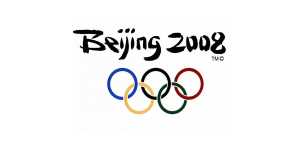Beijing Olympic Fever
SAILING FIT
By: Meka Taulbee
ACE Certified Personal Trainer
SAILFIT Inc
By the time you read this the Olympics will be over and most everyone will have had what I call “Olympic Fever” This is when you watch the Olympics and get so pumped up and excited that you vow that you are starting your Olympic Campaign today. For the next week you train like crazy. Then as a few weeks go by you start to tell yourself that you’ve got 4 years so why rush. Does this sound familiar? Well, I hate to say it, but it takes years to build up to the athletic levels of many of the competitors in Beijing. So don’t put off today what you think you can do tomorrow.
Before I go on I want to recognize some people who are prime examples of years of training in their sport. Congratulations to Anna Tunnicliffe for achieving what so many dream of. A gold medal at the Olympic games. Andrew Campbell is an amazing competitor and person. He’s an excellent role model of how a campaign should work. Mike Leigh is a sailor Canada should be extremely proud of. He is relentless in his work ethic and another great role model.Lisa Ross is another sailor Canada should be proud of. Aside from just being a great person she has put in a lot of hard work and dedication and is someone female sailors can really learn a lot from. Thank you Anna, Andrew and Mike for all of your hard work and for representing the North American Laser Class so well.
For those of you who don’t have Olympic goals in mind, but rather just the next regatta the same applies. Many times people come up to me three days, a week or even one day before the regatta and say, “What should I do to be in shape for this regatta?” Sorry to say, starting your fitness program the day before the regatta begins is not the way to go. Just being in good shape for an event is not a healthy option. Adopting a healthy lifestyle will make each regatta easier and much less painful. A steady, consistent approach is the best way to reach and maintain your optimal performance levels. For example if you wanted to lose weight and keep it off the recommended weight loss rate is two pounds per week. It is unnatural for your body weight to have big swings up and down, not to mention very unhealthy. When you gain or loose weight too rapidly it has just as rapid an impact on your organs or bones. If you gain rapidly you are constricting everything inside and most times when you gain to rapidly it is fat and not muscle you are gaining. This leads to a whole host of other complications. For example elevated blood pressure and cholesterol levels. If you loose too rapidly it puts the natural support system in your body in a weakened state. By taking things at a consistent pace your whole body can adjust to the changes and become stronger and healthier.
Beijing was expected to be a very light air venue. Many of the sailors were at the lowest weight they have seen since they were junior sailors. In order to achieve their optimal weight they did not just starve themselves the week before the Olympics began. Well at least I hope they didn’t! The sailors needed to be able to maintain their strength and agility in the boat as well as being at a lighter weight. When your weight fluctuates it changes how you sail the boat. You may sail the boat differently at a higher weight than at a lower weight and vice versa. For example if you lighter you would have to depower your sail sooner as opposed to if you weighed more.
As the fall & winter sailing season approaches I would like to suggest that everyone start getting ready for the next regatta now. Even if it’s not until December or February and especially if you live up north where the sailing season is coming to an end, now is the time to start. Remember slow and steady progress is the key. Let me break it down to 3 levels.
First, start by spending a few weeks being more aware of what you are eating. NOT DIETING. Just by being more aware you will start to make better food choices naturally. Substitute 2 cans of soda per week with a bottle of water. Trade the bag of chips with lunch one day for an apple or piece of fruit. Eat Breakfast! Most times we don’t even realize that we grabbed another handful of chips in the break room or a candy bar at the checkout until it is in our mouth or gone! When you start to pay attention you start to make different choices. Then these choices become the tendency and not the conscious decision.
Second, spend the following few weeks adding stretching to your daily routine. Stretching is great because you can do it at work, at your desk, in the shower, while watching TV or even in bed. Then try adding in some sort of physical activity once a week. It doesn’t matter what you do as long as you get your heart rate up. Walking, running, swimming, rowing, Basketball, tennis, weight training, it doesn’t matter just get out there and do it! After adding this activity in just once a week you’ll find that it will then become easier to add in additional sessions. Shoot for two or three times a week. Remember to change it up. Don’t always do the same activity for the same amount of time in the same place. You’ll get bored and never want to do it again. Make it fun for yourself. If you have a dog you can take the dog for a walk or run. Make it a family affair and include everyone or get a group of friends together.
Third, put it all together. By now healthier eating habits should be becoming more second nature, you have incorporated injury prevention by stretching and some cardiovascular conditioning. If you find you are really getting into it and enjoying yourself you may try incorporating some additional weights or adding in more activities. Most people think that working out will make them tired. On the contrary, it will give you more energy. You should find that the combination of all of these things will make you sleep better, have a more positive attitude and feel energized. That alone will help boost your sailing performance. Now when you go to the next regatta you are prepared. You may not do any other activities other than sailing during the regatta and your eating habits may slip a bit, but you will already have a good base to work from. It is hard to make the most nutritional choices when you are traveling but if your body has a solid platform to begin with it is easier for it to digest and make up for what it is not getting. The one thing to try to keep up at every regatta is stretching. It will help get your muscles warmed up and loosened up.
Whatever your goals may be just take it step by step and you’ll get there. Don’t be afraid to ask others and see what they are doing. A lot of times you can get good ideas that you can incorporate into your own program.
I can’t wait to see you all at the next Olympic trials! As always, if you want to hear about a certain topic or have any questions about this experiment feel free to contact me. You can always find me at www.sailfit.com or email directly to meka@sailfit.com. I look forward to hearing from you




